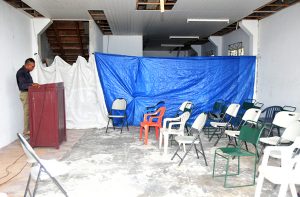ON Friday, just two weeks before Nomination Day, another political party named ‘Destiny to Oneness’ was launched with the hope of causing ripples at the upcoming 2020 General and Regional Elections.
However, while several chairs were set out at the Kitty, Georgetown location, there were no attendees save for the party’s Founder Yenchandra Rambarran and media operatives from the Guyana Chronicle.
It is unclear whether there was an issue with the invites issued or whether the public simply stayed away. Nonetheless, Rambarran presented on his reason for forming the party, the party’s manifesto and the ways in which it would restructure current government functions.
Rambarran, a re-migrant who currently works in the auto-servicing business, said that he formed the party after feeling “hurt” and victimised by both sides of the major political divide at different points in history.
Asked the party’s status when it comes to its members and a List of Candidates in time for Nomination Day, the party founder said that the slots for membership have not yet been filled and candidates are still being sought.
This is even as the party’s name has already been registered with GECOM as amongst the 19 which will contest the coming elections. Destiny to Oneness hopes to form a coalition with other parties contesting the elections and this has to be done by January 10, 2020. Asked what is unique that his party brings to the table, Rambarran said the push “for all Guyanese to unite”. “All these little parties should come together. So, I don’t know, I would do couple more radio programmes and couple more interviews and then ask that we all come together,” he said.

“At this point in time it seems like an impossible programme to get Candidates with the requirements that are needed and I don’t have the kind of resources so I’ll have to join in with others.”
Back in October, the Guyana Chronicle spoke with Working People’s Alliance (WPA) Executive Member, Dr. David Hinds, who stated that it is common practice for small political parties to spring up around elections time. Over the years, the public outcry in some quarters has been that while these parties were formed in the hope of garnering at least 6,000 votes and more to secure a few seats in Parliament, many do not even garner a quarter of the number of votes to secure one seat.
Dr. Hinds said that political parties should not be waiting until an election period to emerge, and must have more going for them than simply being a “pressure group”. “I think in the environment that we have now in Guyana, it’s very polarised, and I don’t think that voters in either of the two big ethnic blocs are about to experiment with a new party, because that’s what they will be doing if they vote for these small parties. It would be an experiment, and I don’t think voters are in the mood to experiment, because, you know, there is a lot at stake in these elections,” he’s said.
Meanwhile, some small parties which formed recently to contest the elections are already considering or have agreed to coalescing for worthwhile impact at the coming elections.
Some of the proposals Destiny to Oneness’ manifesto include placing minimum wage at $100,000; pension at $50,000 and a monetary reward starting at $100,000 for a 70 per cent pass rate by secondary school children per term. The manifesto also pushes for the legalisation of marijuana; releasing of all marijuana prisoners and an immediate halt to traffic harassment by police. Destiny to Oneness also wants to see the establishment of a school unit against bullyism, crime and drug use; the computerisation of all villages; a feasibility study for the establishment of a railway system the establishment of a national marketing centre and more.



.jpg)









